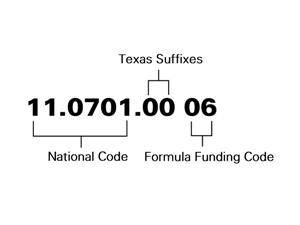CIP Codes
Texas CIP codes are used to identify degree and certificate programs, courses, and declared majors. CIP codes are reflected on the CBM reports and inventories that are sent to the Texas Higher Education Coordinating Board (THECB) on a semester or yearly basis.
Criteria for Assigning Texas CIP Codes

Each course in an inventory is assigned a Texas CIP code which corresponds to the subject matter of that course. CIP codes reflect the content of the course and not the department in which the course is offered or the discipline of the students who take the course. For example, an introductory calculus class taught in the Chemical Engineering department is accurately coded 27.0101.00 (Mathematics) even if the course is taught exclusively to engineering students by an engineering professor.
National CIP codes are six digits in length. Texas CIP codes have an additional 2-digit extension which can further refine the subject matter in question. The 10-digit Texas CIP code consists of the 8-digit Texas CIP code plus the 2-digit default funding code assigned to that CIP code.
Some helpful hints for coding courses:
- When more than one code could logically be used, use the code which is most specific to the subject matter. The areas most likely to contain redundant codes are Agriculture, Business, Education, and Home Economics.
- The specific activity being covered in the course is considered more specific than the place where, or group to which, the activity will be done. Education, in particular, divides subject matter by level of the recipient of the education (e.g., Secondary Education) and then by specific subject (e.g., Science Education). A course in Teaching History in the Elementary School would be coded History Education and not Elementary Education.
- Courses in Special Education and in Early Childhood Education should be coded with those codes and not by specific subjects.
- The CIP code options may be in very different sections of the taxonomy. For instance, a course in Restaurant Management and Food Service may more appropriately be coded 12.0504.00 16 Restaurant, Culinary, and Catering Management/Manager or 19.0505.00 07 Foodservice Systems Administration/ Management, depending on what is actually taught in the course.
- The history, philosophy, or sociology of a discipline is coded with the discipline and not with History, Philosophy, or Sociology.
- Courses for interdisciplinary programs which are not themselves interdisciplinary are coded in the specific discipline. For instance, a course in Native American Social Systems would be coded as Sociology and not American Indian Studies, since it is only about the sociology of Native Americans.
- In Technology and similar codes, the actual function listed in the definition should be considered and not the parts that speak of the occupation of the graduate.
- Use only the default formula funding rate that is listed in the Texas CIP codes taxonomy for the particular CIP code you are using. Using a rate other than the default will result in an error. Changes to the default rate must be requested specifically from the Coordinating Board staff.